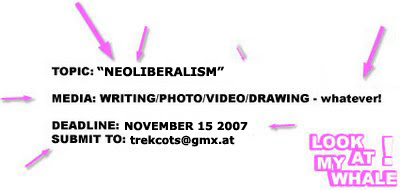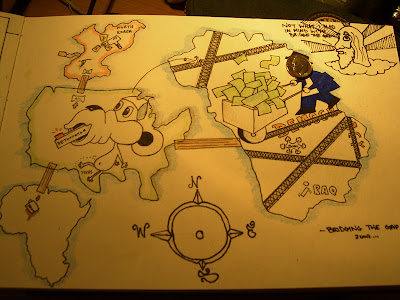[aus: Verinte Nationen, Charta der Menschenrechte (1948); Brecht’s “Die heilige Johanne der Schlachthöfe” und der zur Produktion des gleichnamigen Theaterstuecks im Wiener Akademietheater erschienenen Taschenpostille (1997 )]
ALEXANDER MEDEM

CAMILLO SPIEGELFELD
--------------------------
click -"objet trouvé"-
--------------------------
ERNST SCHWARTZ
Hello
My name is Ian Fisher. I play music, but often I use that music as a cart to carry a message through the ears of listeners too their minds. Due to the fact that the song I recorded to post on this month's blog wouldn't upload to my emails, I will skip the cart this time.
For those of you who don't know about me, I'm from the United States. I thought that I needed to say that in-order to clarify the link between my perspective and neoliberalism. In the US we often hear of neoliberalism in reference to practices that are taking place in other countries (often countries where our governmental/economic elite have tried to impose neoliberal policies to strength the global power of our extreme upper class, but that's beside the point). Though we have played the leading role in the story of neoliberalism, it appears to me as though many Americans are oblivious to it's existence on their-own streets because "liberal" democracy has overtime become so familiar to them that they accept it as common knowledge, or truth, and don't question it. Thus, the stereotypical American personality is the embodiment of liberalism. Thus, a reflection on American civil society and individuals may shed light on the concept itself.
While driving down the wide streets of my country I looked around and started noticing things. A fat suburban woman talking on a cell phone, while cutting me off in an SUV with a Jesus fish plastered to the bumper happened to catch my eye. I couldn't help but image what that woman would have been like one-hundred years ago. I pictured her looking a little older and skinnier with 5 to 7 children speaking German and broken-English on a farm where she worked in the fields from sun up to sun down simply to keep her family and herself alive. I then hung this mental picture next to the soccer mom in front of me and compared the two. I thought about the motives behind their actions. I imaged the woman of one hundred years ago being motivated by the desire to simply survive and provide a better life for her children. I imaged the modern woman, who never went to bed hungry or cold, who never feared her children starving to death, who wants her children's lives to be like hers, as being motivated by increasing her social status and self image. Since her basic needs are fulfilled and the prospect of them not being fulfilled is unimaginable to her, she works not for what she needs, but rather for what she wants. Unfortunately, this woman is not the only person in society wanting more than they need (which is a human tendency, but is extremely harmful to a society that basses its economic structure on greed and over-consumption). Individuals with the ability to increase their level of profit will do so to increase their-own ability to consume. Those who hold the most power in the relationship between the creation of goods and services and the consumption of those goods and services have the ability to decide how profit will be distributed. Since everyone in this relationship wants more, whether it be on the creation side (more pay) or on the consumption side (lower prices), this concentrated group's increased profit margin puts a strain on the entire system. When those who have the power to raise their-own profits do so, the prices of goods and services go up and the profits of those who don't hold power go down. In order to maintain stability, there must be a balance struck between prices and profits. When this is unbalanced the masses become frustrated. In working democratic systems, people's demands are answered by legislation and action on behalf of the government. When those legislations and/or actions threaten the economic elite's power, the elite respond. That response in many modern cases has been neoliberalism, which is an attempt on behalf of the economic elite to weaken institutions that stand the way of them attaining more profit.
To finish my thought about the woman in the SUV, I asked myself a question. What would happen if the ability for her to attain what she wanted feel apart? Would her motivation switch to surviving and providing for her children? Yes. However, I believe her inflated level of wanting would remain. Further more, when/if she fought for change, she would be fighting, to a certain extent, for the return of her ability to consume. Upon her victory, her greed would simply set back in motion the same system that starved her.
I believe that our generation will see the effects of these policies and there will come an awakening. From our past the stage is set. Neoliberalism has burnt our flags, the Internet has untied our tongues, global war and media have broke our crosses, and our fathers' communists have hung themselves in their-own rusted chains. The time of decision is comeing. To continue to fight like cavemen over rocks or to work together and use them to build a new world.
IAN FISHER

ISIS FRISCH & DIANA FRISCH

MARKUS MEZNIK
THADDÄUS STOCKERT
Neo-liberals who turn to drink turn conservative in the morning.
Neo-liberally,
I pour wine at table.
Je refuse l'affaire Dreyfus
But accept your scotch with glee.
First I voted with my feet.
Then I voted at the bar.
Come morning, I'm conservative,
Comforted by misty tradition.
MARK BOUSFIELD







PHILLIP SULKE
DIE ÄRGSTEN FEINDE DER FREIHEIT SIND GLÜCKLICHE SKLAVEN
GABRIELA WASSER











































